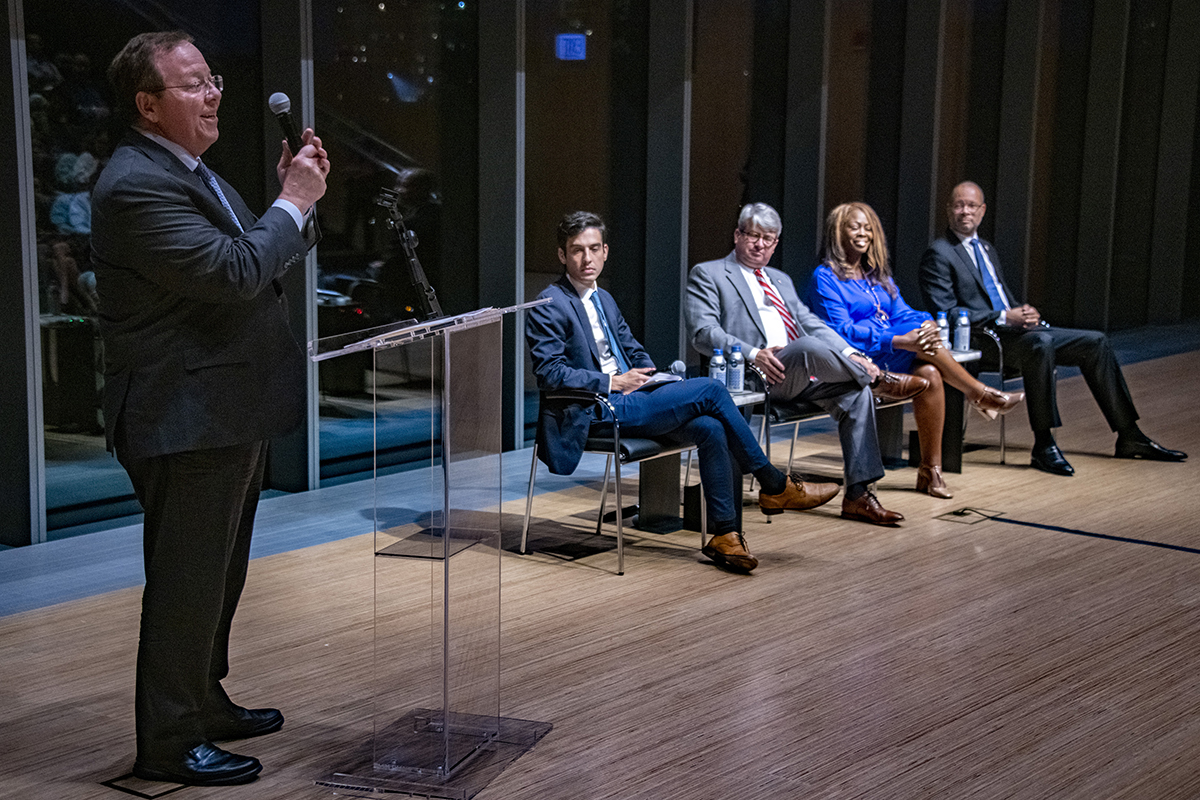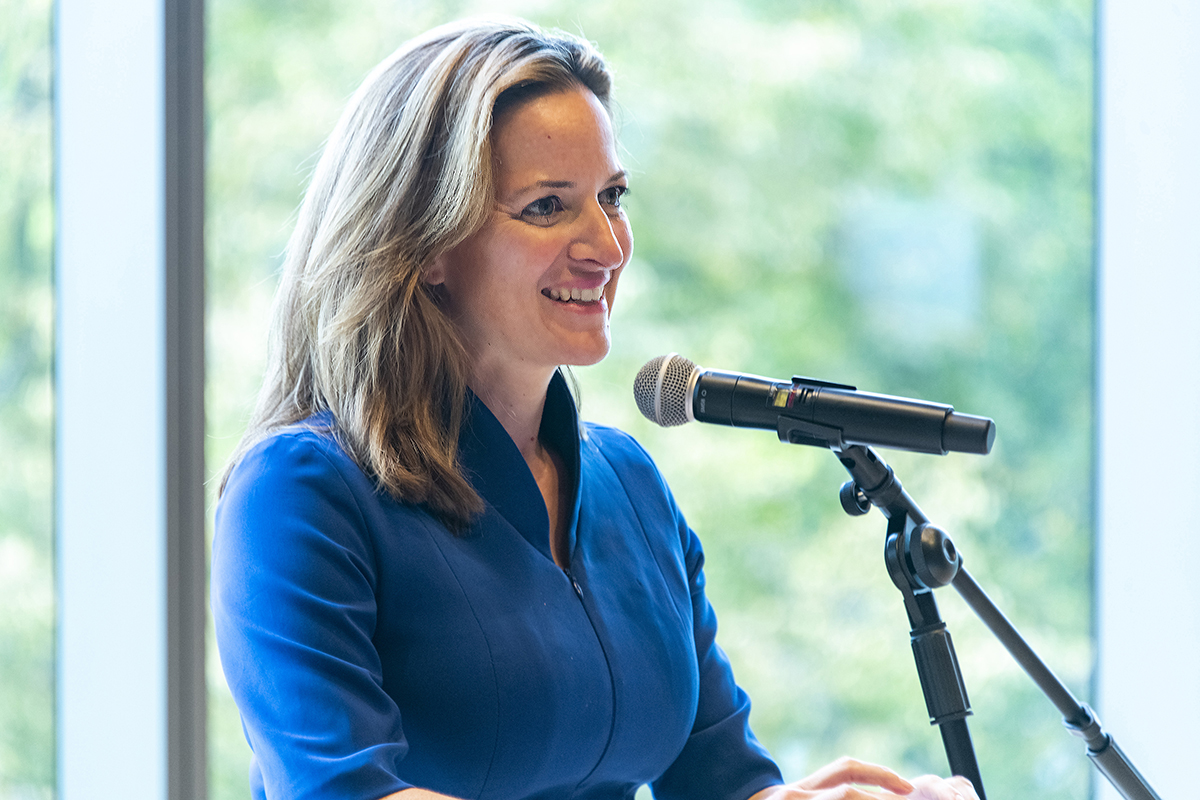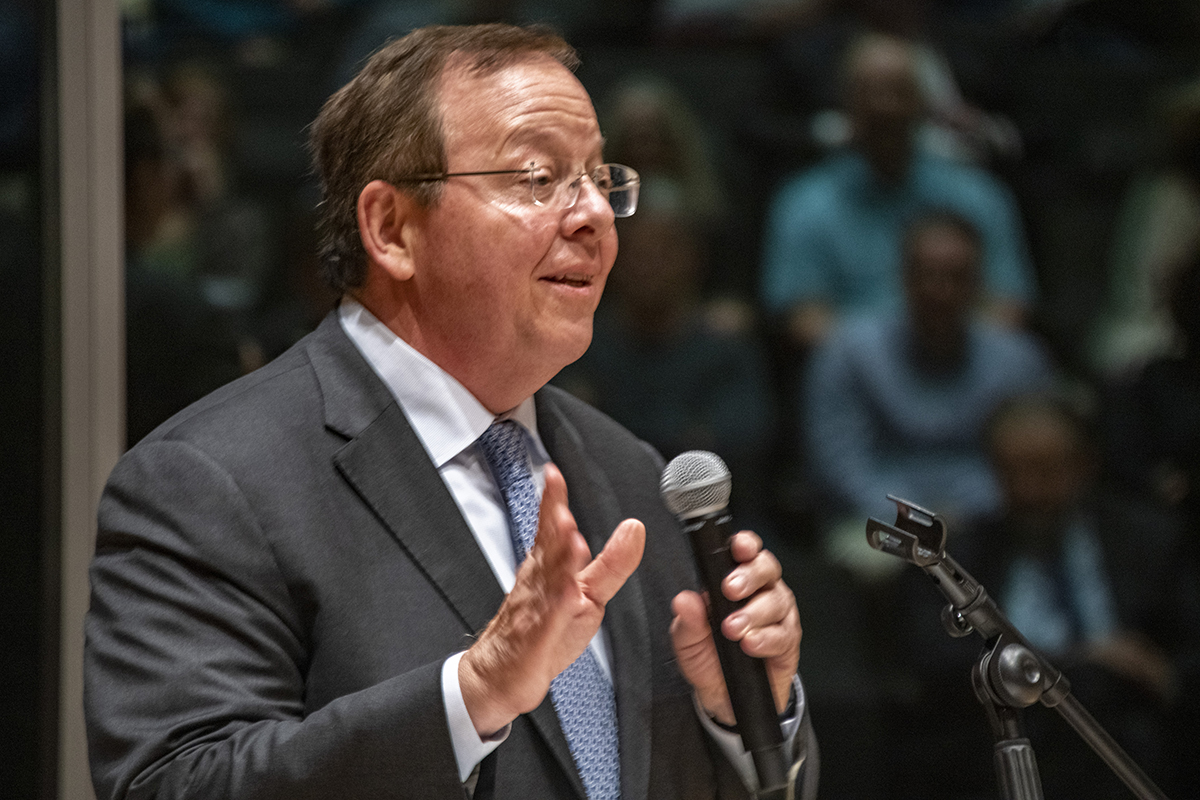American Democracy Is Under Threat, But There is Hope
Experts and elected officials came together for “Democracy and Distrust: Overcoming threats to the 2024 election,” an event that grappled with violence in politics
By Sarah Steimer
On Tuesday, September 26, voting experts, officials from battleground states, researchers, and journalists met for a temperature-taking of threats against democracy: what we’re willing to accept, what we’re defending against, and how concerned we should be about the future of the country. Through presentations and a panel discussion in an event co-organized by the Chicago Project on Security & Threats (CPOST) and The Guardian, a melding of personal and professional experiences and academic research on election interference provided a full Friedman Hall at the Rubenstein Form important perspectives.
“Tonight’s program is an exploration of the threats to American democracy and the ways in which our institutions — government, community, education, and the media — can and must combine to preserve and protect what we hold dear,” said Robert Pape, professor of Political Science and CPOST director.
Following a video message from Illinois Governor J.B. Pritzker, Michigan Secretary of State Jocelyn Benson delivered the keynote. Having overseen Michigan’s 2020 and 2022 general elections — which drew record-breaking turnout and earned her the John F. Kennedy Profile in Courage Award and the Presidential Citizens Medal — Benson is keenly aware of the threats to free and fair polls.
“I believe ultimately the best chance we have in our country for equality, for equity, for everyone having equal access to power and opportunity in our country begins and ends with equal access to the vote,” Benson said, in one of the first references made to a larger conversation around voting equity that evening.
Benson’s remarks focused largely on the realities that she has witnessed, both harrowing and hopeful. She recounted one night in December 2020 when dozens of armed individuals showed up outside her home. She recalled thinking of how little stood between the angry crowd and her family. “I also thought at that moment, is this what it means to defend democracy, protecting my family against threats of violence at our doorstep while trying to protect the accurate results of a legitimate presidential election?”
Yet long before that night, Benson and her team had worked to stem misinformation, compel Michiganders to vote, and keep those votes safe. Prior to the 2020 election, her office worked with local clerks to modernize the state’s voter registration systems. They implemented automatic voter registration, sent absentee ballot request forms to every registered voter in the state, and installed more than 1,000 secured drop boxes across Michigan. They partnered with nonpartisan organizations to provide access to information around their right to vote.
“As the accurate results of the election began to be known, we thought we would see cause for celebration, not because one person won or the other, but because we had protected our elections,” Benson said. “In the days and weeks that followed, we battled an unprecedented, unexpected, nationally coordinated effort to interfere with the tabulation of valid votes, to block the certification of the election results, and attempt to submit a false alternate slate of electors. Through all of that, and particularly on January 6th, it became clear to me that the work that we had done throughout 2020 to protect and defend democracy was just the beginning.”
In looking ahead to the 2024 election, Benson said the nation must be prepared but remain hopeful. For example, she points to the 2022 election, when Michigan voters not only rejected 2020 election deniers on the ballot, but voted in record numbers to amend the state constitution to expand the right to vote and protect democracy.
Benson said she expects more election deniers to run for office, and she expects more lies to proliferate — often with the help of foreign adversaries who have much to benefit from the faltering of American democracy. She also acknowledged the number of election officials who’ve left their posts in the years since 2020 amid threats and exhaustion. But she noted that those who stayed in their roles have shown a heightened sense of resiliency, and tens of thousands of new individuals have signed up to be election workers around the country. She listed new efforts being designed to deter misinformation, voter suppression, and other attempts to thwart a fair election — including tapping into the expertise in other states as a more coordinated and unified front.
“As we head into 2024, I hope we can do so with the confidence that we've overcome these challenges to democracy already twice in two different cycles,” Benson said. “But we also know that the future of our democracy will be determined by whether we in this moment do all we can to recognize the ongoing threats to our elections, and work together with truth in the law and the vast majority of American people on our side, to ensure the threats and those levying them do not succeed.”
Pape’s address, which followed Benson’s remarks, underscored the need to focus on those majority of Americans who want to defend democracy from threats — even, as CPOST’s research shows, there is a “dedicated minority of millions of Americans willing to support force to overturn election results.”
The CPOST research has shown that support for political violence has moved into the mainstream: Of the 1,066 charged for the January 6 insurrection as of mid-August, only 13% are Oathkeepers, Proud Boys, and members of other militia groups —meaning almost 90% of those who went to the Capitol were not on this fringe. That mainstream portion of the group, Pape said, consists of business owners, doctors, lawyers, architects, and others we would not typically deem extremists.
In their national surveys of anti-Democratic attitudes among Americans, CPOST researchers have explored the distrust of Democratic institutions, political conspiracy theories, and lack of restraint in support for political violence: “Essentially the erosion of the key norms that are crucial for our democracy to work.”
Overall, Pape said, the tracker suggests that today, Americans are more deeply distrustful of their Democratic institutions and Democratically elected leaders, and more supportive of political violence to achieve political goals. Violent support for former President Donald Trump is up since summer 2021, as well as more Americans radically opposed to preventing Trump from returning to the White House. The findings suggest that the country has to prepare for a much more intense and potentially more violent politics as the Trump trials and primaries commence.
Pape also pointed to positive news within the research, or at least an opportunity to counter the far more concerning survey results: The researchers consistently found that 80% of Americans — including 80% of Republicans and 80% of Democrats — abhor political violence and strongly support bipartisan solutions to stop it. “Given our polarized times, this is a remarkable agreement,” Pape continued. “We should lean into this common ground that recognizes the enduring importance of the democratic norm of restraint in the use of force to settle political disputes.”
The strategy, therefore, is to unify that 80%, rather than focus on the 20%. And it’s already been proven: The predicted red wave of the 2022 election never took shape.
The event closed with a panel moderated by Guardian democracy reporter Sam Levine and featured individuals closely involved in recent elections: Georgia election official Gabriel Sterling, who helped manage the 2020 presidential election and recount in Georgia; Nevada Attorney General Aaron D. Ford, the battleground state’s 34th attorney general and the first Black individual to take statewide constitutional office; and Black Voters Matter founder LaTosha Brown, a nationally recognized expert in Black voting rights and voter suppression.
The trio began by describing what they see as the greatest threats to future elections. Sterling discussed cascading threats: The possibility that violence at the polls on the east coast will have a trickle-down effect and keep people at home across the country or spur copycat actors. Or, similarly, of foreign actors spreading misinformation that incites violence here at home.
Brown voiced concerns that the country has not yet equated racial violence as a part of political violence. “When we're not honest to deal with what we're facing in this country, then we're not going to really get to the root of the problem,” she said. “When we're talking about political violence, we're talking about something greater. Because really, the root of all violence is in this notion that humanity is in some way less, it has a lesser value for some people than others.”
Ford reiterated both Sterling and Brown’s concerns, and then noted one of the points from Pape’s presentation: that the extremists are also in the mainstream. He pointed to his own predecessor, the previous Nevada attorney general, who argued that the election was stolen. “We talk about the 80 and the 20%, but I think that we have to talk about the 20% relative to them not just being the fringe of the fringe: They are neighbors of those in this room,” Ford said. “It's not as fringe as you would think.”
During the course of the conversation, Brown described threats toward herself and her team while traveling in different parts of the country to get the vote out, along with threats made to voters and poll workers. But she also reiterated the importance of empowering people to vote. “The reality, though, is, I recognize what's at stake,” she said. “We do the work that we do because we recognize that the alternative has far greater consequences.”
The conversation continued onto the importance of repeating facts to counter misinformation, determining how and when to prosecute threats, and where there is — in fact — positivity for democracy moving forward. While there were disagreements among the panelists, the theme remained steady: To stop the threat of violence in politics, Americans have to come together more diligently than ever to fight misinformation and protect everyone’s right to vote.
The event closed out with final words from both Pape and Guardian U.S. editor Betsy Reed. “In discussions like this and the other kinds of issues we cover at the Guardian — including climate change, and racial injustice, also some more upbeat topics — you can often be left with a sense of despair,” Reed said. “But what I really appreciated about tonight's event … is a sense of hope and a sense that, here are the things that need to be done about these critical and very challenging issues facing us.
 THE UNIVERSITY OF CHICAGO
THE UNIVERSITY OF CHICAGO




